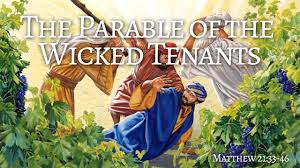
The Parable of the Wicked Tenants is a powerful narrative Jesus shares in Matthew 21:33-46, Mark 12:1-12, and Luke 20:9-19. This story not only reveals the themes of stewardship and accountability but also points to God’s gracious patience and the ultimate rejection of His messengers.
A Vineyard Entrusted
“Listen to another parable: There was a landowner who planted a vineyard. He put a wall around it, dug a winepress in it and built a watchtower. Then he rented the vineyard to some farmers and moved to another place.
Matthew 21:33
The parable begins with a landowner who meticulously prepares a vineyard, surrounds it with a wall, digs a winepress, and builds a watchtower. He then leases it to tenants and departs on a journey, entrusting the care and productivity of the vineyard to them.
This vineyard represents the blessings and responsibilities God has given to His people. The tenants symbolize those entrusted with God’s work and mission. Just as the tenants were expected to care for the vineyard and produce fruit for the owner, we are called to steward God’s gifts effectively and faithfully.
The Rejection of Messengers
When the harvest time approached, he sent his servants to the tenants to collect his fruit.
“The tenants seized his servants; they beat one, killed another, and stoned a third. Then he sent other servants to them, more than the first time, and the tenants treated them the same way.
Matthew 21:34-35
At harvest time, the landowner sends his servants to collect his share of the fruits. However, the tenants abuse, stone, and even kill the messengers. This act of violence and rebellion happens multiple times, revealing the tenants’ deep-seated rejection and defiance of the landowner’s authority.
These messengers represent the prophets sent by God to guide, correct, and remind His people of their covenant responsibilities. The tenants’ reaction is a reflection of humanity’s repeated rejection of God’s word and messengers throughout history.
The Ultimate Sacrifice
Last of all, he sent his son to them. ‘They will respect my son,’ he said.
“But when the tenants saw the son, they said to each other, ‘This is the heir. Come, let’s kill him and take his inheritance.’ So they took him and threw him out of the vineyard and killed him.
Matthew 21:37-39
Finally, the landowner sends his beloved son, thinking the tenants would respect him. Instead, they conspire to kill the son, hoping to seize his inheritance. This foreshadows the rejection and crucifixion of Jesus, God’s Son, whom the religious leaders and society would ultimately reject and kill.
This tragic climax of the story underscores the gravity of humanity’s rebellious nature and highlights the patience and costly love of God. Despite rejection, God’s love compels Him to offer His Son, desiring reconciliation and restoration.
Consequences and New Beginnings
“Therefore, when the owner of the vineyard comes, what will he do to those tenants?”
“He will bring those wretches to a wretched end,” they replied, “and he will rent the vineyard to other tenants, who will give him his share of the crop at harvest time.”
Jesus said to them, “Have you never read in the Scriptures:
“‘The stone the builders rejected
has become the cornerstone;
the Lord has done this,
and it is marvelous in our eyes’?“Therefore I tell you that the kingdom of God will be taken away from you and given to a people who will produce its fruit. Anyone who falls on this stone will be broken to pieces; anyone on whom it falls will be crushed.”
When the chief priests and the Pharisees heard Jesus’ parables, they knew he was talking about them. They looked for a way to arrest him, but they were afraid of the crowd because the people held that he was a prophet.
Matthew 21:40-46
Jesus concludes the parable by declaring that the kingdom will be taken away from those who reject the Son and will be given to others who will produce its fruits. This is a sobering reminder that rejecting God’s grace and call to faithfulness has consequences.
Yet, in this warning, there is also hope and promise. The call to bear fruit remains open to all who will embrace God’s Son and live in obedience to Him. The stone the builders rejected, Jesus tells us, has become the cornerstone—pointing to His resurrection and the foundation He lays for all who believe.
Responding with Faithfulness
As we reflect on the Parable of the Wicked Tenants, we are invited to examine our own lives. Are we faithfully stewarding the gifts, responsibilities, and opportunities God has entrusted to us? How are we responding to His messages and the call of His Son in our lives?
This story urges us to embrace our role as stewards of God’s kingdom, ensuring our lives bear fruit in alignment with our faith. It calls us to recognize and cherish the incredible patience and opportunity for redemption offered through Christ.
Living as Faithful Stewards
May this parable inspire us to live as faithful stewards of our lives and the Gospel. Let us respond to God’s grace with gratitude and obedience, committing ourselves to produce fruit that reflects His love and justice.
In doing so, we participate in the continued unfolding of God’s kingdom, bearing witness to His truth and redemption in the world. As we remain anchored in Christ, the cornerstone, our lives become testimonies of hope, faithfulness, and renewal.
Other Resources Available:
- FaithAnswersPress.net: Grow in your faith and share your hope with others. Find biblical answers about the Christian faith. VISIT THE SITE NOW
- Download the FAQs of Faith app for easy access to Faith Answers Press LLC websites, answers to spiritual FAQs, and a daily faith-boosting podcast. DOWNLOAD NOW